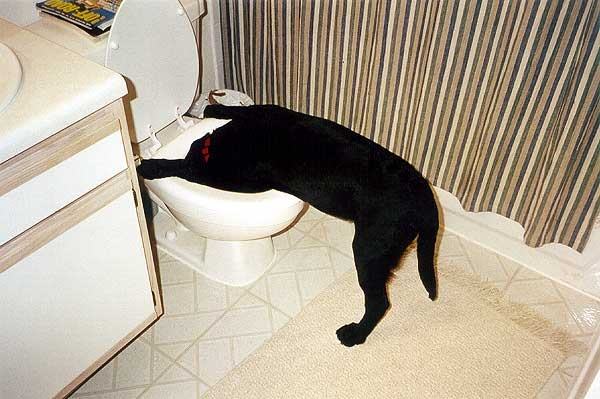Is your dog throwing up? Dogs vomit frequently and not all causes warrant medical intervention. Some will be self-limiting and not life threatening, but some are dangerous and it is important to know which causes can be an emergency and which can tolerate a “wait and see” attitude. Here are some of the common reasons that dogs throw up.
Foreign Body Ingestion
When your dog eats something that is not a food item, like a ball or a toy, you may want to call your vet sooner rather than later. Even if the item is small and likely to pass, it is a good idea to have your veterinary team on standby just in case. As indigestible items pass through the stomach and bowel, they can cause profound irritation at the very least and they can completely block the bowel. Complete obstruction is a surgical emergency. The longer you watch and wait, the sicker your dog will get.
If you know that there is a ball or toy missing and your dog is vomiting and acting sick, don’t delay. If he has foul smelling, projectile vomit and is not even able to hold down clear liquids, it is an emergency. This is a time to take your pet to your vet. If it is after hours, these symptoms do not need to wait. Go to the animal ER.

If your dog is curious, plays with toys and likes to put non-food items in his mouth, foreign body ingestion should be on the list of reasons why your dog is throwing up. Look around for missing items or pieces of chewed up toys and call your vet.
Ingestion of Non Ideal Food Items
Some vets like to term this syndrome “Garbage Intoxication”. When dogs eat food items that are not typically a part of their normal fare (like people food from the trash or dead animals outside), they can vomit. It may be self-limiting with only a few episodes of vomiting on the day of the exposure, but if it continues for more than a day or becomes protracted (vomits several times or is unable to hold down clear liquids), it is time to call the vet. In the meantime, it is probably wise to withhold solid food to let the stomach rest, but give plenty of clear liquids in small frequent amounts.
In some cases, this will progress to more serious issues, like pancreatitis, so get help if your dog vomits more than a few times. If your dog is a “chow hound” who gets into the trash or is a non-discretionary eater and vomits, start by withholding solid food but giving clear liquids for no more than 12 hours. If the signs worsen or continue despite the fasting and fluids, don’t delay and call your vet.

Metabolic Disease
These are things like renal (kidney) disease and liver disease. The mechanism for the vomiting in these cases is different from the foreign body, but you will need a vet’s help to uncover these causes. Each will have a different treatment protocol and prognosis, so getting to the root cause is essential. These cases will usually be characterized by intermittent vomiting, not always associated with eating or drinking and are often accompanied by other signs that may not be obvious, like increased water consumption or urination.
If your dog is middle aged and older, not normally one to chew on toys or get into trash and you may have noticed other seemingly unrelated signs, you should make an appointment with your vet. It may not warrant an ER trip and intermittent vomiting can usually wait for your regular vet.
Infectious (Stomach Bugs)
Believe it or not, dogs can get stomach bugs just like people. Viruses and bacteria can make your dog vomit. These patients sometimes have a fever also and many do not seem to feel well. Diarrhea can accompany or follow the vomiting. Even if your dog is not around other dogs, you can track infectious agents in on your shoes or they can hang out on the grass or soil of your yard for your dog to pass.
Infectious gastroenteritis can become severe and contribute to dehydration, but if treated appropriately, your dog should recover without incident. You will need a veterinary team to help you with this one if the vomiting goes for more than a day or so or if diarrhea develops. The two symptoms together can rapidly dehydrate your dog and must be addressed.
Unless you have delayed, infectious gastroenteritis should be able to wait long enough for an appointment with your regular vet and not the animal ER.

Other Causes
There are other unusual causes of vomiting in dogs. Things like developmental defects in puppies or gastrointestinal cancers in older dogs. These miscellaneous causes will require veterinary diagnostics to unearth the source and because they are so varied, they have different treatment protocols and prognoses.
Vomiting can be a sign of serious diseases and disorders, especially if it continues for more than an episode or two and your dog is acting like she feels bad (lying around and not interested in normal activities). Scan your environment for possible culprits, like partially chewed or missing toys and upturned trash cans. Don’t give human medications for gastric upset. Let your vet decide what needs to be given based on his/her exam and diagnostic results and don’t complicate the picture with miscellaneous medications. Take up solid food, offer clear liquids and call your vet!
